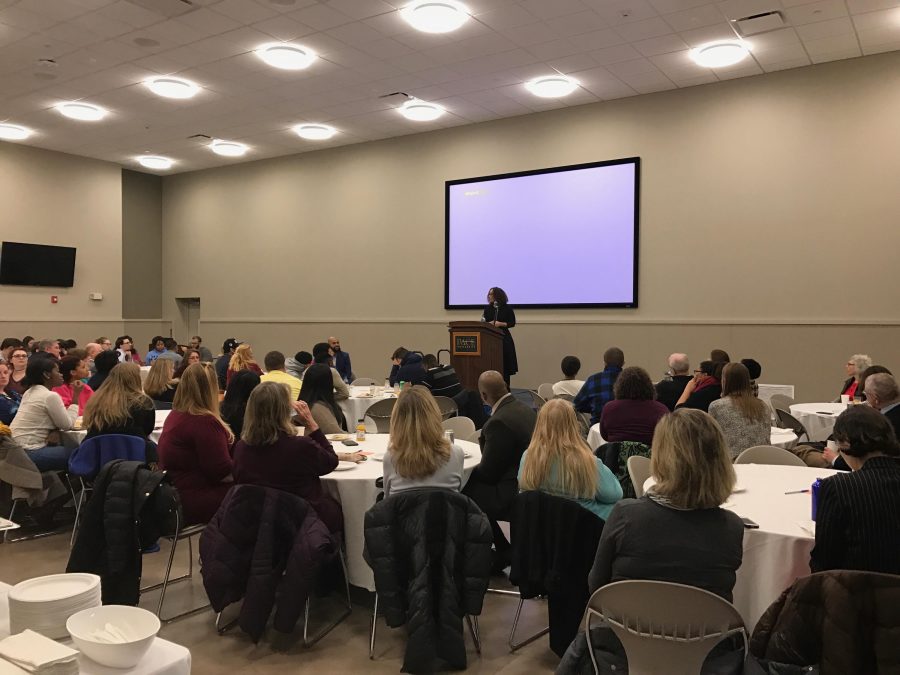MLK Commemoration Addresses Current Social Issues
The Office of Multicultural Affairs and Diversity Programs hosted its 17th annual Dr. Martin Luther King Jr. Commemoration Brunch, titled “What Would Martin Do,” on Jan. 28.
Keynote speaker Tricia Rose discussed King’s legacy as well as racial issues affecting the US.
Rose is a professor of Africana Studies and the director of the Center for the Study of Race and Ethnicity in America at Brown University, with a focus in the civil rights era, black US culture, popular music, social issues, gender, and sexuality.
She is also the author of a book on the emergence of hip-hop culture, titled Black Noise: Rap Music and Black Culture in Contemporary, which won an American Book Award from the Before Columbus Foundation, was voted among the 25 books of 1995 by the Village Voice, and was listed by Black Issues in Higher Education as one of “The Top Books of the Twentieth Century.”
Rose says that she thinks the election of President Donald Trump is the most significant resurgence of white male supremacy in the US since the Jim Crow and segregation laws were ended.
“It is the reauthorization of a deep kind of patriarchy and sexism that mainly has been in existence as white supremacy but that had been pushed to the margins as kind of a culture of moderate constraint,” said Rose. “That apparently is completely not the case any longer. Not just in terms of policy but in terms of appointments, in terms of who matters, and its terms of the conversation about gender, not just individual policy.”
Rose encouraged the crowd to embrace King’s ideas about connecting people of all backgrounds, being against war, and economic justice in order to survive in modern times. She also encouraged individuals to use resources from all ideologies in order to be informed.
According to Rose, society supports “structural racism” that works to isolate minorities and prevent them from gaining as much power in society as whites. This, she says, happens through wealth gaps, housing opportunities, disparities in job hiring and in the justice system, and having only minorities blamed for their poor conditions instead of all of society.
“The system rewards some people significantly more than it does other people and it’s built into policy practice and institution to produce basically an array of dynamics that normalize and legitimize communitive and chronic adverse outcomes for people of color,” Rose said. “[These dynamics affect] economic outcomes, social outcomes, political outcomes, and educational outcomes. When we have a society that continues to support that, it speaks to the kind of racism of which Jim-Crow was only one iteration.”
Rose advocated for attendees to protest using non-violent civil disobedience like the marches have that occurred since Trump took office, and by supporting things they fear will be destroyed under the Trump administration. She recommended reading Indivisible, which is an online guide written by former congressional staffers for resisting the Trump agenda.
Senior Keyshana Dupuy challenged the “Not My President” movement, stating that she found it to be divisive, even though she supports people standing up for what they believe in. Rose responded by linking the “Not My President” movement to the “Birther” movement under former President Barack Obama and said the reason for the movement is because Trump’s presidential campaign had the most vitriol and hatred out of any in her lifetime.
“I think it’s amazing what we’re doing with the [protests.] I just want to know if us going against our president before even allowing him to make a big mistake that says that he can’t be our president is messing us up. But [Rose] made a good point in saying that these a difference in disrespecting the actual presidency, the White House and the government, versus saying I don’t agree with him and his actions, so he is not my personal president,” Dupuy said.
English Professor Victoria Devries, who brought her students to the event, found it very educational and says that she encourages other professors to bring their students to “similar” events.
“It’s a no-brainer to [attend this event.] This is so stimulating to the students we get a lot of mileage out of it, from an instructional standpoint and from the student’s point of view. There should be more of these things,” Devries said.
Your donation supports independent, student-run journalism at Pace University. Support the Pace Chronicle to help cover publishing costs.

